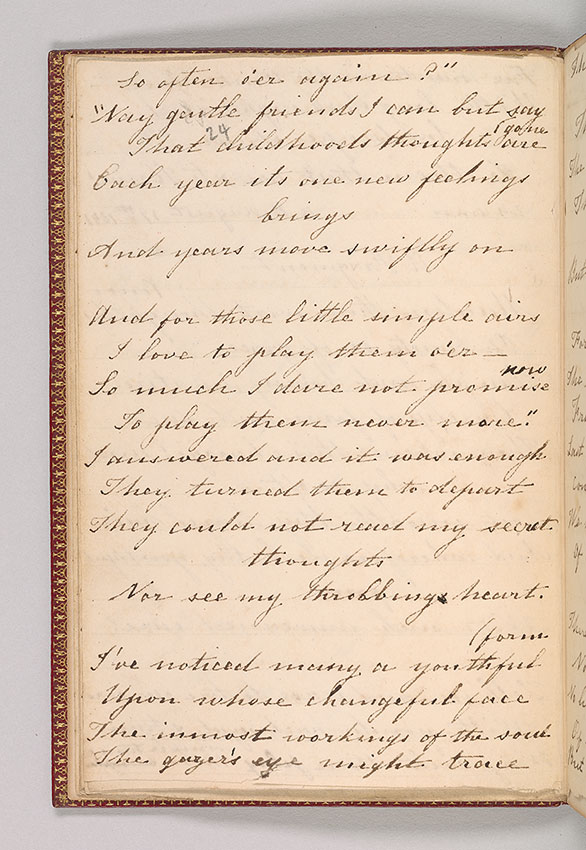
Collection of poems : autograph manuscript signed : [Haworth]
The Henry Houston Bonnell Brontë Collection. Bequest of Helen Safford Bonnell, 1969
“A Fragment” (“Self-Congratulation”) (pp. 23–26)
Composed on New Year’s Day 1840, when Brontë was about to turn twenty. This is the only composition in the notebook to be included in the first published book by Charlotte, Emily, and Anne Brontë, Poems by Currer, Ellis, and Acton Bell (London: Aylott & Jones, 1846). Titled “A Fragment” in the manuscript, “Self-Congratulation” in Poems. For publication, Brontë made several revisions, changing the first word from “Maiden” to “Ellen,” for example, removing the Gondal “signature” Olivia Vernon, and revising punctuation. Poem 9 in Chitham (1979); pp. 463–65 in Alexander (2010).
So often o’er again?
“Nay gentle friends I can but say
That childhood[’]s thoughts are gone
Each year its one new feelings brings
And years move swiftly on
And for those little simple airs
I love to play them o’er –
So much I dare not promise now
To play them never more.”
I answered and it was enough
They turned them [i.e., then] to depart
They could not read my secret thoughts
Nor see my throbbing heart.
I’ve noticed many a youthful form
Upon whose changeful face
The inmost workings of the soul
The gazer’s eye might trace
Text as published in Poems (1846)
So often, o’er again?
“Indeed, dear friends, I can but say
That childhood’s thoughts are gone;
Each year its one new feelings brings,
And years move swiftly on:
“And for these little simple airs—
I love to play them o’er
So much—I dare not promise, now
To play them never more.”
I answered—and it was enough;
They turned them to depart;
They could not read my secret thoughts,
Nor see my throbbing heart.
I’ve noticed many a youthful form,
Upon whose changeful face
The inmost workings of the soul
The gazer well might trace;
| Attachment | Size |
|---|---|
| 20.04 MB |
